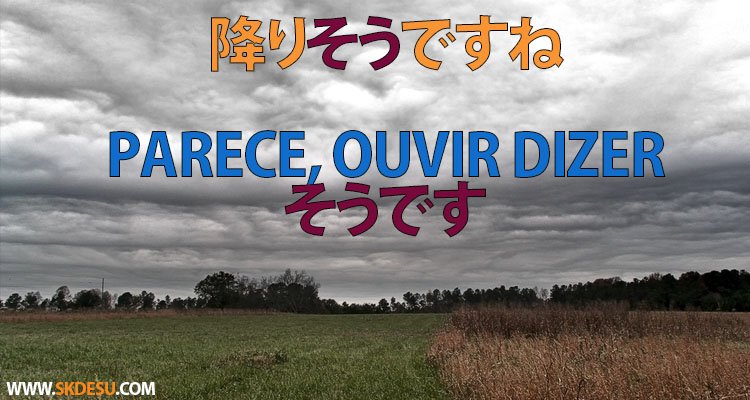In this article, we will explore how to use the expression "Ouvir Dizer" in Japanese. It is a simple concept that involves the word そう (sou) in combination with です (desu) or other conjugations.
The expression is applied when the speaker reports something they heard from someone else, functioning as a way to convey rumors or unconfirmed information. For more informal situations, instead of そうです (soudesu), we use そうだ (souda).
Table of Content
Meanings and Context of Use
The expression そうです is often used to convey rumors or probabilities, with meanings such as:
- looks like ~
- hear say that ~
- people say ~
- is about to ~
- be going to ~
- prone ~
- almost ~
Another use of そう occurs with adjectives to indicate an impression or prediction. Here are some examples:
- 美味しそう - Oishisou - looks delicious
- 重そう - Omosou - seems heavy
- 暑そう - Atsusou - it seems hot
- 優しそう - Yasashisou - seems pleasant
- 良さそう - Yosasou - seems to be good

Using そう with verbs
The expression そう also applies to verbs, modifying the meaning to fit the context of the sentence. Here are some illustrative examples:
- 泣きそう - naki-sou - cry
- 来そう - kisou - vir
- 起きそう - okisou - to raise
- しそう - shisou - Do (する)
- 落ちそう - (You) are going to fall
- 降りそう - furisou - It looks like it's going to rain.
- 降らなさそう - furanasasou - It seems that it won't rain.
example sentences
Now how are the verbs or adjectives in a sentence? Let's see some examples below:
中に眠りそうだった。
Chū ni nemuri-sōdatta.
Translation: I almost fell asleep during class.
あの子が泣きそうです。
Ano ko ga naki-sō desu.
Translation: This child is crying.
雨が降りそうです。
Ame ga furi-sō desu.
Translation: It looks like it's going to rain.
もう食べられそう?
Mō taberare-sō?
Translation: Do you think we can eat now?
ねえ、今日来られそう?
Nee, kyō korare-sō?
Translation: Hey, do you think we can go out today?
雪が降りそうですね。
Yuki ga furi-sō desu ne.
Translation: It looks like it's going to snow.
この本は高そうです。
Kono hon wa taka-sō desu.
Translation: This book looks expensive.
この映画はとてもいいそうだ。
Kono eiga wa totemo ii sō da.
Translation: I heard that this movie is very good.
昨日雪が降ったそうです。
Kinō yuki ga futta sō desu.
Translation: I heard it snowed yesterday.
彼女は弁護士だそうだ。
Kanojo wa bengoshi da sō da.
Translation: I heard she's a lawyer.
If we conjugate そう in the following way, we have different meanings:
- そうもない - soumonai - Very unlikely
- そうにもない - sounimonai - improbable, impossible
でも、そんなこと、ありそうにもないでしょう?
Demo, son'na ko to, ari-sō ni mo naideshou?
Translation: It doesn't seem likely, but does it?
今君は自分で自分を監視できそうにもないよ。
Ima kimi wa jibun de jibun o kanshi deki-sō ni mo nai yo.
Translation: You are currently not able to be your own tutor.

そうですか
To conclude, it is worth highlighting the famous expression そうですか (sou desu ka), which means "Really?" and may even sound a bit sarcastic depending on the context. Now that we better understand the use of そう, it is worth reflecting on how it fits into this question: what leads someone to use this expression and what is the intention behind it? This reasoning exercise will help deepen your understanding even further.
With the knowledge gained about the meaning and applications of そう, our sentences in Japanese become richer and more expressive. Understanding how a single word can convey so many nuances allows us to better grasp what the Japanese want to say in different situations. The next step is to practice: memorize the examples, use them in conversations, and over time, the expression そう will become a natural part of your vocabulary, allowing you to communicate more fluently and accurately.
